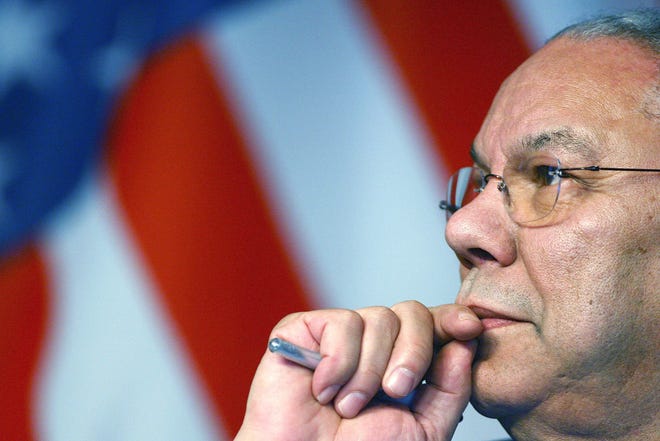(Akiit.com) “As the world goes forward, we cannot start going backwards. African-Americans have come too far and we have too far yet to go to take a detour into the swamp of hatred. We, as a people who have suffered so much from the hatred of others must not now show tolerance for any movement or any philosophy that has as its core the hatred of Jews or the hatred of any other group. Our future lies in the philosophy of love and understanding and caring and building. Not of hating and tearing down. We know that – each and every one of us know that to the depth of our heart – and we must be prepared to stand up for it and speak up for it.” – Gen. Colin Powell, Commencement Address at Howard University, May 14, 1994
Like many children of immigrants, Colin Powell saw the United States as a land of infinite opportunity. As a Black man who battled racism and prejudice at every step on his extraordinary journey, he was well of the obstacles to that opportunity. He was a Black trailblazer who resisted being defined by race, but never forgetting what his achievements and status meant to those who came after him.
Powell, who died this week at the age of 84, was a longtime friend and supporter of the National Urban League. He will be remembered as a man of principle, courage, and strength, who never wavered in his determination to hold America to the highest standards, and as a role model whose life story will inspire generations of public servants who put the interests of the nation above party affiliation.
The National Urban League honored Gen. Powell with its Humanitarian Award at the Equal Opportunity Dinner in 2009 for his exemplary global leadership during his career as a soldier, statesman and diplomat. Gen. Powell also served on the National Urban League’s Honorary Centennial Committee and was a key supporter of “I Am Empowered,” an initiative to eliminate racial gaps in housing, education, employment, and healthcare.

Gen. Powell was a consistent and generous contributor to the National Urban League for many years, inspired by his admiration for Whitney M. Young – who led the League through the turbulent years of the Civil Rights Movement – and his close friendship with Vernon Jordan, who left the League to serve alongside Powell in President Reagan’s administration.
Though he was uncomfortable even then with Republican policies and attitudes about race – he later become much more critical of what he called “a dark vein of intolerance in some parts of the party” — he felt that his position of authority at the highest levels of government could both inspire fellow Black Americans, and prejudiced whites “purge the racism from their systems.” He looked to Young’s example:
“As the train approached the 125th Street station in Harlem, Young would ask himself, should he get out and demonstrate, or should he continue on downtown,” Powell wrote of Young’s daily commute. “Young appreciated the movement’s hell-raisers. But he stayed on the train, concluding that what he did downtown to promote jobs for black is American corporations was a better use of his talents.”
After Jordan’s death in March, Powell posted on his Facebook page: “Vernon Jordan, one of my dearest friends, left us yesterday. I met Vernon over 30 years ago when I became Deputy National Security Advisor to President Reagan, and we became fast friends and have remained close these many years. He began his career as a lawyer fighting segregation and became a civil rights icon. He was a tall man and matched that imposing stature with his intellect and force of personality. He counseled Presidents, Members of Congress, corporate leaders, and civil rights leaders. He was unfailingly discreet. I will miss him dearly and Alma and I extend our condolences to his wife Ann and the family.”
In the ethnically diverse South Bronx neighborhood where he was raised, Powell had no sense of being a minority because “there was no majority.” It wasn’t until his ROTC summer training at Fort Bragg, North Carolina, in 1957 that he met whites who were not Poles, Jews or Greeks. Largely sheltered on the base from the Jim Crow policies of the era, he was stunned at the end of six weeks when a white sergeant suggested that he was named second-best cadet in the encampment, instead of first, because of racism.
Driving home through the segregated south gave him a “more elemental taste of racism,” he wrote. As a newly-commission lieutenant at Fort Benning, Georgia, the following year, he was confronted with full reality. “I was plunged back into the Old South every time I left the post,” he wrote. “I occasionally felt hurt; I felt anger; but most of all I felt challenged. I’ll show you!”
Rising to become the country’s first Black National Security Adviser, first Black Chairman of the Joint Chiefs of Staff and first Black Secretary of State, Powell wielded a profound influence. Ted Johnson, the director of the Fellows Program at the Brennan Center for Justice and a retired Navy commander, told CNN: What Thurgood Marshall was to young Black civil rights lawyers? That’s what Powell was to young Black military members in the late 1980s and early 1990s. “Suddenly, it wasn’t ridiculous to dream that I could one day be in one of those rooms — in the Tank at the Pentagon, or in the Situation Room at the White House.”
Columnist; Marc Morial
Official website; http://twitter.com/MARCMORIAL









Leave a Reply